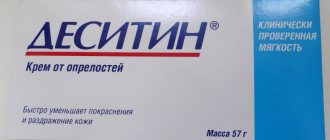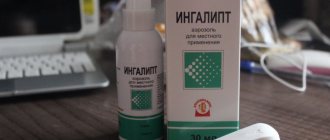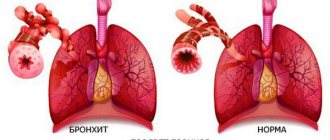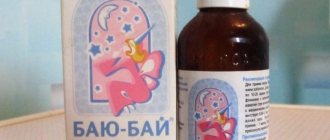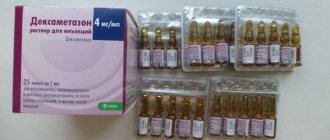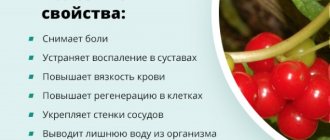Trade name of the drug: Amiksin®
International nonproprietary name: Tiloron
Chemical name: 2,7-bis-[2(diethylamino)-ethoxy]-fluoren-9-one dihydrochloride
Dosage form of the drug: film-coated tablets
Description Composition per tablet Pharmacological properties Indications for use Contraindications Use during pregnancy and breastfeeding Method of administration and dosage Side effects Overdose Interaction with other drugs Effect on the ability to drive vehicles and machinery Release form Expiration date Storage conditions Dispensing conditions from pharmacies Name and address of the manufacturer/organization receiving consumer complaints
Composition per tablet
Tiloron - 60 mg or 125 mg.
Excipients: core: potato starch - 25,500 mg or 46,000 mg, microcrystalline cellulose - 60,000 mg or 120,000 mg, povidone-K30 (kollidon 30) - 1,500 mg or 3,000 mg, calcium stearate - 1,500 mg or 3,000 mg, croscarmellose sodium ( primellose ) – 1,500 mg or 3,000 mg; shell: hypromellose (hydroxypropyl methylcellulose) – 3.4050 mg or 6.8100 mg, titanium dioxide – 1.7815 mg or 3.5630 mg, macrogol-4000 (polyethylene glycol-4000) – 0.4565 mg or 0.9130 mg, polysorbate -80 (Tween-80) – 0.0570 mg or 0.1140 mg, quinoline yellow dye (E 104) – 0.1235 mg or 0.2470 mg, sunset yellow dye (E 110) – 0.1765 mg or 0.3530 mg.
Pharmacotherapeutic group: antiviral immunostimulating agent – inducer of interferon formation.
ATX code: J05AX
Analogs
Good analogues of Amiksin are:
Lavomax is a drug that has antiviral and immunomodulatory effects. Prescribed for various forms of hepatitis, herpes, pulmonary tuberculosis, ARVI, influenza, chlamydia. Prescribed for complex therapy. Contraindicated in pregnant women, during lactation, and persons under 18 years of age.
Tiloram is a drug that has an antiviral effect. Taken for hepatitis A, B, C, influenza, ARVI. Contraindicated for pregnant women and children under 18 years of age.
Tiloron is an antiviral drug that has a stimulating effect on the human immune system. Effective in the treatment and prevention of influenza and acute respiratory viral diseases. Also helps with tuberculosis, hepatitis and multiple sclerosis. Do not take during pregnancy, breastfeeding or children under 7 years of age.
Pharmacological properties
Pharmacodynamics. A low-molecular-weight synthetic interferon inducer that stimulates the formation of all types of interferons in the body (alpha, beta, gamma and lambda). The main producers of interferon in response to the administration of tilorone are intestinal epithelial cells, hepatocytes, T-lymphocytes, neutrophils and granulocytes. After taking the drug orally, the maximum production of interferon is determined in the sequence intestines - liver - blood after 4-24 hours. Amiksin® has an immunomodulatory and antiviral effect. In human leukocytes it induces the synthesis of interferon. It also stimulates bone marrow stem cells, depending on the dose, enhances antibody formation, reduces the degree of immunosuppression, and restores the ratio of T-suppressors and T-helpers. The drug is effective against various viral infections, including influenza viruses, other acute respiratory viral infections, hepatitis viruses and herpes viruses. The mechanism of antiviral action is associated with inhibition of the translation of virus-specific proteins in infected cells, as a result of which viral reproduction is suppressed.
Pharmacokinetics. After oral administration, Amiksin® is rapidly absorbed from the gastrointestinal tract. Bioavailability – 60%. About 80% of the drug binds to plasma proteins. The drug is excreted almost unchanged through the intestines (70%) and through the kidneys (9%). Half-life (T1/2) – 48 hours. The drug does not undergo biotransformation and does not accumulate in the body.
special instructions
Amiksin can be purchased at a pharmacy without a doctor's prescription. Should be stored at temperatures up to 25 degrees away from children. Avoid exposure to light.
Shelf life – 36 months.
Many people are interested in the question of whether Amiksin is an antibiotic. The medicine does not belong to the group of antibiotics, but is an immunomodulatory drug.
Before taking the medicine, you should consider its compatibility with alcohol. The drug should not be taken in parallel with alcohol, since the latter reduces the effect of the active substances, which is why the desired result will not be achieved.
Does not affect the ability to drive vehicles and other dangerous machinery.
The drug can be used in parallel with antimicrobial agents and antibiotics.
Directions for use and doses
Amiksin® is taken orally after meals.
For children from 7 to 18 years: For uncomplicated forms of influenza and other acute respiratory viral infections - 60 mg 1 time per day on the 1st, 2nd and 4th day from the start of treatment. The course dose is 180 mg (3 tablets).
For adults (over 18 years old). For the treatment of influenza and other acute respiratory viral infections - 125 mg per day for the first 2 days of treatment, then 125 mg after 48 hours. The course dose of Amiksin® is 750 mg (6 tablets).
For the prevention of influenza and other acute respiratory viral infections - 125 mg once a week for 6 weeks. Per course - 750 mg (6 tablets).
For the treatment of herpes, cytomegalovirus infections - the first two days, 125 mg, then after 48 hours, 125 mg. Course dose – 1.25–2.5 g (10–20 tablets).
When treating influenza and other acute respiratory viral infections, if symptoms of the disease persist for more than 4 days, you should consult a doctor
Instructions for use
The tablets are intended to be taken orally after meals.
- To prevent hepatitis A, you need to drink 1 tablet once every 6-7 days, for 5-6 weeks. For therapy you need to take 2 tablets on the 1st day and after 2 days, 1 tablet. In total you need to take 10 tablets.
- To treat hepatitis B, you need to drink 1 tablet in the first 2 days, and after 2 days, 1 tablet. The course of treatment is 16 tablets. In the chronic form of the disease, the course of treatment can last six months.
- For the treatment of hepatitis C, you need to take 1 tablet in the first 2 days, and after 2 days, 1 tablet. In total you need to take 20 tablets. For chronic illness, the course of treatment can be increased to 40 tablets.
- For colds and flu, you need to take 1 tablet in the first 2 days, and then 1 tablet after 2 days. A total of 6 tablets are required.
- Patients with tuberculosis need to take 2 tablets in the first 2 days, and then 1 tablet after 48 hours. The therapeutic course includes taking 20 tablets.
- For chlamydia, in the first 2 days you need to take 1 tablet, and then 1 tablet. every 2 days. The treatment course includes 8 tablets.
- Patients with cytomegalovirus infection should take 1 tablet in the first 2 days, and then 1 tablet every 48 hours. The maximum duration of treatment is 1.5 months.
- If neuroviral diseases of infectious origin are detected, then you need to take 1 tablet in the first 2 days, and then 1 tablet every 48 hours. The course of treatment involves taking 10 tablets.
Composition and release form
Film-coated tablets - 1 tablet.
tilorone - 0.06 g excipients: basic magnesium carbonate; PVP; calcium stearate; Aerosil; Vaseline oil; sugar; talc; tropeolin O; titanium dioxide; gelatin; beeswax in polymer jars of 6 or 10 pcs.; in a cardboard pack 1 jar. Film-coated tablets - 1 tablet. tilorone - 0.125 g excipients: basic magnesium carbonate; PVP; calcium stearate; Aerosil; Vaseline oil; sugar; talc; tropeolin O; titanium dioxide; gelatin; beeswax in polymer jars of 6 or 10 pcs.; in a cardboard pack 1 jar.
Dosage of Amiksin
Amiksin is taken orally after meals, for prophylactic purposes - 125 mg once a week for 4-6 weeks, for therapeutic purposes - 125-250 mg/day for 1-2 days, then 125 mg every 48 hours. Course treatment: influenza and other acute respiratory viral infections in adults - 1 week; hepatitis A-2-3 weeks; hepatitis B-3-4 weeks; herpetic, CMV and chlamydial infections and their combinations - 4 weeks. Chronic viral hepatitis B and C, mixed hepatitis - 250 mg 2 times a week, course of treatment - 2-4 weeks. Secondary immunodeficiencies and interferon status disorders - 125 mg 2 times a week. The course of treatment is 2-4 weeks. Multiple sclerosis - 125 mg every 48 hours (10 tablets in total). Treatment of influenza and other acute respiratory viral infections in children over 7 years of age - 60 mg per day in the first 2 days, then 60 mg after 48 hours (3-4 tablets in total). For children over 7 years of age, Amiksin is prescribed in a dosage of 60 mg.
Features of application
The drug Amiksin® for adults (at a dosage of 125 mg) is indicated for use in the following cases:
For influenza and other acute respiratory viral infections for prevention and treatment. It is advisable to carry out prophylaxis after contact with a source of infection, as well as during seasonal outbreaks of viral infections (late autumn - early spring), which usually coincides with weakening of the immune system. The regimen for taking Amiksin® for prophylactic purposes is very simple: you need to take a tablet once a week for a course of 6 weeks. Treatment with Amixin® can be started on any day of the disease, but it will be most effective if the drug is started early. In any case, it helps to shorten the duration of the disease, reduce the severity of symptoms (fever, intoxication, catarrhal symptoms, etc.) and minimize the risks of complications. In the first 2 days of treatment, Amiksin® is prescribed 1 tablet per day, and then 1 tablet every 48 hours. A total of 6 tablets are enough for the course.
To fight herpes. The use of Amiksin® allows you to suppress the exacerbation of a chronic infection, reduce the duration of the disease and relieve the main symptoms (blistering rashes, burning, itching, etc.), and also helps prevent the development of relapses of herpes infection in the future. The drug should be taken one tablet on the 1st and 2nd days, and then one tablet after 48 hours. A course requires from 10 to 20 tablets.
Precautionary measures
If you follow the dosage and course duration recommendations specified in the description of the drug Amiksin®, the likelihood of side effects (short-term chills, nausea and other symptoms of dyspepsia) is low. Treatment with Amiksin® is contraindicated during pregnancy and lactation; it should not be given to children under 7 years of age or in case of hypersensitivity to tilorone or the auxiliary components of the drug.
1. Instructions for medical use of the drug Amiksin
Indications for use of Amiksin
Amiksin has an immunomodulatory and antiviral effect.
Amiksin is an antiviral drug, an inducer of interferon synthesis. Used in adults for the treatment of viral hepatitis A, B, C, herpes and CMV infections, in complex therapy: infectious-allergic and viral encephalomyelitis (multiple sclerosis, leukoencephalitis, uveoencephalitis), chlamydial infections of the urogenital and respiratory tract; prevention of influenza and ARVI. In children over 7 years of age, Amiksin is used to treat influenza and other acute respiratory viral infections.
How Amiksin® 125 mg works
The antiviral effect of Amiksin® is achieved due to its etiotropic and pathogenetic action.
- Amiksin® increases the body's overall resistance to viral infections and other diseases by stimulating the immune system. As a result of its intake, the production of endogenous interferon of all types (alpha, beta, gamma and lambda) is activated, the formation of specific antibodies is increased, and the ratio of T-lymphocytes is normalized. Taking Amiksin® helps improve the condition of the immune system without grossly interfering with its work and without introducing foreign components, since the production of its own interferons is stimulated.
- The drug has a direct antiviral effect: by preventing the synthesis of virus-specific proteins in affected cells, it is able to suppress the reproduction of viruses.
In addition, a number of advantages of the drug should be noted.
- Amiksin® 125 mg is available in a convenient form - tablets for oral administration. The number of tablets in one package is sufficient for a complete standard course of prevention or treatment of influenza and other acute respiratory viral infections.
- Amiksin® 125 mg is compatible with other drugs used for viral infections - etiotropic, symptomatic, antibacterial.
Description of the dosage form
Film-coated tablets, light yellow to yellow, round, biconvex in shape. The cross section shows 2 layers. The core of the tablet is orange.
Pharmacokinetics
After oral administration, it is quickly absorbed from the gastrointestinal tract. Bioavailability is 60%. Plasma protein binding is about 80%. It does not undergo biotransformation and does not accumulate in the body. T1/2 is 48 hours. It is excreted almost unchanged in feces (70%) and urine (9%).
Pharmacodynamics
Stimulates the formation of interferons (alpha, beta, gamma) by intestinal epithelial cells, hepatocytes, T-lymphocytes and granulocytes. After oral administration, the maximum production of interferon is determined in the sequence intestine - liver - blood after 4-24 hours. Stimulates bone marrow stem cells, depending on the dose, enhances antibody formation, reduces the degree of immunosuppression, restores the T-helper/T-suppressor ratio. Effective against influenza viruses and viruses that cause acute respiratory viral infections, hepato- and herpes viruses, etc. The mechanism of antiviral action is associated with inhibition of the translation of virus-specific proteins in infected cells, as a result of which virus reproduction is suppressed.
